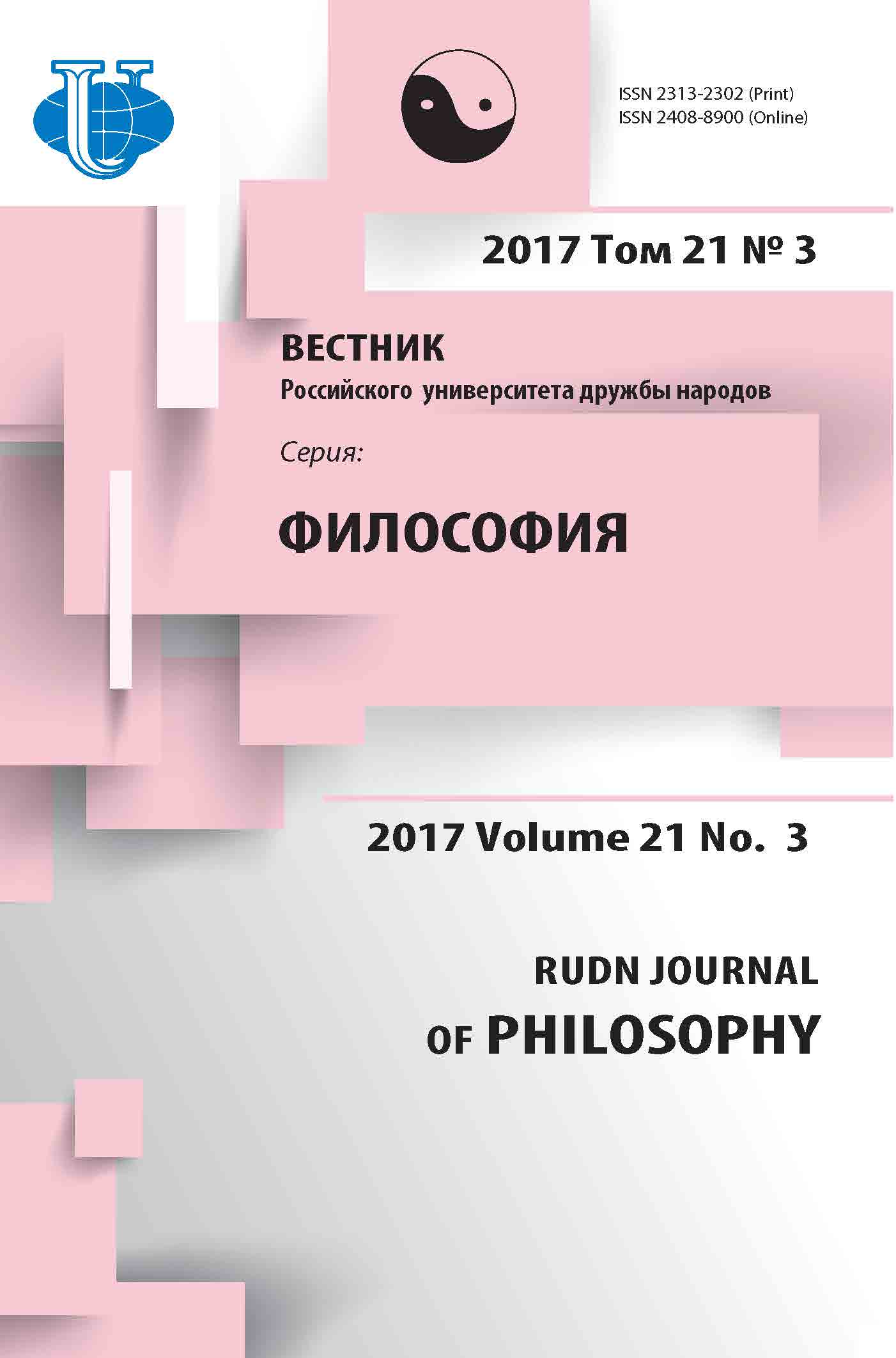THE MORAL PHENOMENON OF SERVICE
- Authors: Moiseenko MV1
-
Affiliations:
- Peoples’ Friendship University of Russia (RUDN University)
- Issue: Vol 21, No 3 (2017)
- Pages: 338-345
- Section: Articles
- URL: https://journals.rudn.ru/philosophy/article/view/16981
- DOI: https://doi.org/10.22363/2313-2302-2017-21-3-338-345
Cite item
Full Text
Abstract
This article examines the phenomenon of moral Service, highlights the main value com-ponents of the concept of Service. The phenomenon is investigated mainly through the prism of social Service in the forms of charity and benevolence drawn from the history and from modern Russia. The enor-mous role of the state and state ideology that guides society with high moral standards is emphasized in the article. Social Service in the forms of charity and philanthropy has deep roots in Russian history, starting from the first Russian princes and the clergy. The mercy is always seen in the history of Russia as the highest value. In modern Russia the strong focus is also set on the acts of mercy. Multiple awards and state prizes have been given to citizens and organizations supporting orphanages, nursing homes, hospices and medical institutions located on the territory of the Russian Federation. The Service is regarded as a form of patriotism. The article highlights the importance of the personality of the teacher in moral and patriotic upbringing of the younger generation. The appeal to the themes of patriotism and Service is illustrated by the example of the Colloquiums of the Department of Ethics within the framework of the educational work in RUDN. In conclusion the author defines the basic moral values of people who devoted their lives to the high ideals of Service. According to the author, this is: patriotism, humanistic aspirations, open-mindedness, high moral ideals, highly developed sense of duty, honor and dignity, tender conscience, altruistic motives, hard work, professionalism, priority of spiritual values over material, self-sacrifice. Service is a feat in a long-term perspective.
Keywords
About the authors
M V Moiseenko
Peoples’ Friendship University of Russia (RUDN University)
Author for correspondence.
Email: moiseenko_mv@rudn.university
Моисеенко Марина Валентиновна - кандидат философских наук, доцент, кафедра этики факультета гуманитарных и социальных наук
6, Miklukho-Maklaya St., 117198, Moscow, Russian FederationReferences
- Dictionaries and encyclopedias on the Academic. Available from: http://spiritual_culture. academic.ru/2064/%D0%A1%D0%BB%D1%83%D0%B6%D0%B5%D0%BD%D0%B8%D0%B5/ fundamentals of spiritual culture. (In Russ).
- Aphorisms. Available from: http://www.foxdesign.ru/aphorism/author/a_stolipin.html. (In Russ).
- Kiryushina NY, Shartanova AV. Stanovlenie fenomena social’nogo sluzhenija v istorii dorevo¬ljucionnoj Rossii. Available from: http://cyberleninka.ru/article/n/stanovlenie-fenomena-sotsialnogo-sluzheniya-v-istorii-dorevolyutsionnoy-rossii/. (In Russ).
- Smirnov GN. Etika delovyh otnoshenij. Moscow: Izdatelstvo “Prospekt”; 2013. (In Russ).
- Moiseenko MV Tema ljubvi v tvorchestve I.A. Il’ina. Puti i zadachi duhovnogo vozrozhdenija Rossii. Moscow: PFUR; 2014. p. 142—149. (In Russ.)
- biggest charitable organizations of Russia. Available from: https://www.miloserdie.ru/ article/pervye-v-rejtinge-10-krupnejshih-blagotvoritelnyh-organizatsij-rossii. (In Russ).
- Reshetnikova ON. Issledovanie motivacionnoj gotovnosti molodezhi k dobrovol’cheskomu sluzheniju. Razvitie dobrovol’cheskogo sluzhenija rossijskoj molodezhi. Moscow: Publishing house of RSSU, 2008. p. 63—65. (In Russ).
- Moiseenko MV. Patriotizm kak princip vysshej shkoly. Etika vysshej shkoly. Moscow: PFUR; 2016. p. 91—97. (In Russ).
- Lapshin IE. Vysshee obrazovanie kak faktor socializacii sovremennoj molodezhi: eticheskij aspekt. Bulletin of the Russian University of friendship of peoples. Series: Philosophy. 2016; 3:88—95. (In Russ).
- Mukhametzhanova VS, Moiseenko MV, Savvina OV, Kosorukova AA. Code of Ethics as an instrument for Maintaining Professional Ethics of University Professors. 3rd International Multidisciplinary Scientific Conference on Social Science and Arts. Book 3 “Anthology, Archae¬logy, History and Philosophy”. 2016;1:403—410. doi: 10.5593/sgemsocial2016HB31403-410.
- Tsvyk IV. Prepodavanie etiki v tehnicheskih vuzah: problemy i perspektivy. Bulletin of the Russian University of friendship of peoples. Series: Philosophy. 2016; 3:26—33. (In Russ).
- Mukhametzhanova VS. Eticheskij kodeks kak nravstvennyj reguljator professional’noj dejatel’¬nosti municipal’nyh sluzhashhih. Bulletin of the Russian University of friendship of peoples. Series: Philosophy. 2015; 2:78—83. (In Russ).
- Tsvyk VA. Etika vysshej shkoly (na primere Rossijskogo universiteta druzhby narodov). Bulletin of the Russian University of friendship of peoples. Series: Philosophy. 2016; 3:9—18. (In Russ).
- Moiseenko MV. Etiko-psihologicheskie etjudy I.A. Il’ina. Otkryvaja sovremennost’ zanovo. Moscow: PFUR; 2011. p. 490—501. (In Russ).
















